Volcanic Eruptions
What are Volcanic Eruptions?
Volcanic eruptions occur when magma from within the Earth's mantle and crust rises to the surface. This can happen due to the buildup of pressure or the release of gases within the magma chamber.
Types of Volcanic Eruptions
There are several types of volcanic eruptions, including:
- Effusive Eruptions: These are characterized by the relatively gentle outpouring of lava, often creating shield volcanoes.
- Explosive Eruptions: These eruptions involve the violent ejection of ash, gas, and rock fragments, often leading to the formation of composite or stratovolcanoes.
- Phreatic Eruptions: These occur when water comes into contact with hot rocks or magma, leading to explosive steam-driven eruptions.
Causes of Volcanic Eruptions
Volcanic eruptions are caused by a combination of factors, including:
- Tectonic Plate Movement: The movement of tectonic plates can cause magma to rise and lead to volcanic activity.
- Pressure Buildup: As magma accumulates and creates pressure within a volcano, it can eventually lead to an eruption.
- Gas Release: The release of gases such as water vapor, carbon dioxide, and sulfur dioxide can trigger volcanic eruptions.
Effects of Volcanic Eruptions
Volcanic eruptions can have various effects on the environment and human populations, including:
- Lava Flows: These can destroy vegetation, buildings, and infrastructure in their path.
- Ashfall: Volcanic ash can disrupt air travel, cause respiratory problems, and impact agricultural activities.
- Pyroclastic Flows: These fast-moving currents of hot gas and volcanic matter can be highly destructive to anything in their path.
- Climate Impact: Large eruptions can release enough ash and gas to affect global climate patterns for years.
Studying Volcanic Eruptions
To study volcanic eruptions, scientists use a variety of tools and methods, including:
- Seismology: Monitoring earthquake activity near volcanoes can provide insight into magma movement.
- Gas Sampling: Collecting and analyzing gases emitted by volcanoes can help predict eruptions.
- Remote Sensing: Using satellites and other technology to monitor changes in surface temperature, gas emissions, and topography.
- Field Observations: Visiting volcanic sites to study rocks, deposits, and landforms associated with past eruptions.
Conclusion
Volcanic eruptions are complex geological events with far-reaching impacts. Understanding the causes and effects of volcanic activity is essential for both scientific research and hazard mitigation efforts.
[Volcanic Eruptions] Related Worksheets and Study Guides:
.◂Science Worksheets and Study Guides Eighth Grade. Organic compounds
Study Guide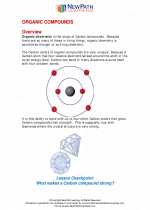 Organic compounds
Organic compounds  Worksheet/Answer key
Worksheet/Answer key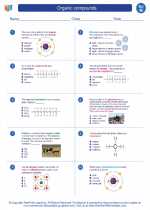 Organic compounds
Organic compounds  Worksheet/Answer key
Worksheet/Answer key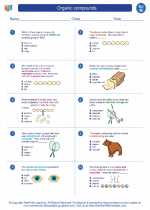 Organic compounds
Organic compounds  Worksheet/Answer key
Worksheet/Answer key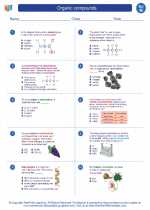 Organic compounds
Organic compounds  Vocabulary/Answer key
Vocabulary/Answer key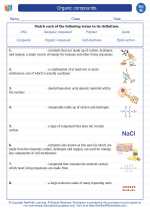 Organic compounds
Organic compounds  Vocabulary/Answer key
Vocabulary/Answer key Organic compounds
Organic compounds 

 Worksheet/Answer key
Worksheet/Answer key
 Worksheet/Answer key
Worksheet/Answer key
 Worksheet/Answer key
Worksheet/Answer key
 Vocabulary/Answer key
Vocabulary/Answer key
 Vocabulary/Answer key
Vocabulary/Answer key

The resources above cover the following skills:
Physics: Students will use scientific skills and processes to explain the interactions of matter and energy and the energy transformations that occur.
Thermodynamics: Identify and explain that heat energy is a product of the conversion of one form of energy to another.
Identify and describe the various forms of energy that are transformed in order for systems (living and non-living) to operate: Chemical - Flashlight-Light; Mechanical - Pulleys-Motion; Solar/Radiant - Solar calculator; Chemical - Plant cells.